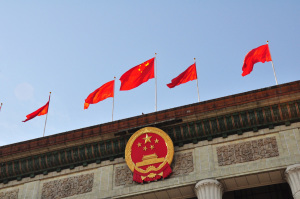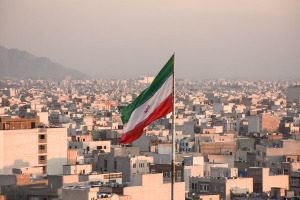China monitoring mobile phones, blocking 'harmful' words like 'Almighty God'

A former employee of one of China’s largest tech firms has revealed how the Communist regime is manipulating public opinion by monitoring citizens’ mobile phones, blocking any words deemed “sensitive to the state” — such as “Almighty God.”
Mr. Li, a former employee of China Mobile Online Services Company, a subsidiary of China Mobile Limited, the state-owned and largest telecommunications service provider in mainland China, told religious liberty magazine Bitter Winter that there is “simply no privacy in China,” with authorities monitoring social media, calls, and messages on mobile phones.
“If one says anything deemed unfavorable to the CCP, he or she will be punished. Every person is monitored and controlled under the pretext ‘to crack down on harassment,'” Mr. Li said.
Before resigning from his post, Mr. Li worked as a “censor” along with about 500 other employees, monitoring the company users’ phone calls and messages.
The surveillance program, which covers all China Mobile users in the 31 provincial-level administrative units, excluding Hong Kong, Macau, and Taiwan, is programmed to automatically detect anything concerning politics and religious beliefs.
Once “harmful” information is discovered — such as remarks critical of the CCP and unfavorable to the state leaders — company employees are assigned to review it thoroughly, Mr. Li revealed.
“If anyone were not careful enough and missed a piece of sensitive information, this would result in the deduction in monthly salary and year-end bonus,” he recalled. “I usually had to handle more than ten thousand pieces of information every month. It was unavoidable to make mistakes, at least one or two a year.”
Religion-related words and phrases, like “Almighty God” and “Falun Gong,” are among words deemed “sensitive,” along with any mention of revoking membership in the Communist Party or the Communist Youth League.
“Anything deemed unfavorable to the CCP is labeled ‘political,’” Mr. Li explained. “For example, immediate measures will be taken to intercept messages that mention the CCP’s organ harvesting from Falun Gong practitioners to prevent leaks.”
“If any sensitive words were deducted during phone calls, in MMS, SMS, or messages on social networking sites like WeChat, the system would automatically intercept the information and users’ services would be deactivated instantly, disabling these people to make phone calls or send messages,” Mr. Li continued. “If users want to reactivate the service, they have to go to a China Mobile service center with their ID card and write a statement promising never to share any sensitive information again.”
Comments deemed particularly “inappropriate” can carry harsher penalties, Mr. Li revealed. He shared how, in May, a resident in the southeastern province of Fujian was intercepted on the border, and his passport was destroyed by border guards who told him that he was prohibited from traveling abroad because he had previously made remarks criticizing the CCP and state leaders.
His comments were deemed “insulting to the government” and “disturbing public order.”
“The censorship criteria have been constantly updated in recent years, resulting in more heavy censorship and fewer loopholes,” Mr. Li added.
Anther employee of an internet censorship company told Bitter Winter that jokes and satirical remarks or videos about the government and its leaders have to be deleted immediately. A minor oversight by the employee results in harsh punishment, the employee said.
The Chinese government’s censorship of online activity is well documented.
Any references to Winnie the Pooh have been banned from China’s social media platforms, including Weibo and WeChat. Additionally, sharing information about the fictional teddy bear has been deemed illegal ever since President Xi Jinping was compared to it in 2013.
Last year, China banned online retailers from selling the Bible in efforts to control the country’s growing religious scene.
This week, footage circulated on social media of a man handcuffed to a metal chair being interrogated by the Chinese police for criticizing the traffic police on social media. The man, called Luhua, is forced to confess to “badmouthing” police on various social media platforms. He then apologizes for his comments.
On December 1, the Chinese government rolled out plans requiring all-new smartphone owners to register with facial recognition scans, Radio Free Asia reported.
The measure was described by the ministry of industry and information as a way to “protect the legitimate rights and interest of citizens in cyberspace.” However, the new rule makes Chinese mobile phone and internet users easier to track, reflecting the central government’s increasing crackdown on the rights of private citizens, rights activists warn.
"In China, the government can ask us to surrender any privacy without any conditions or limitations," Pan Lu, a former high school teacher in the eastern province of Jiangsu, said. "This is exactly like [the slogan] 'Big Brother is Watching You' in the novel '1984' [by George Orwell]."





























